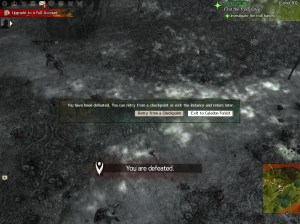World Health Organization’s recent action recognizing “gaming disorder” as a mental condition in the International Classification of Diseases (ICD) had sparked much public attention. This addition of a new medical term that recognizes excessive and addictive gaming as a mental issue had lead to the discourse of questioning whether there is enough research evidence to link gaming addiction to the traditional notion of mental disorder (Rogers, 2018).
From my perspective of playing Guild War 2 over the past four months, I can definitely see the logic of why playing MMORPG like GW2 could be addictive. Even though I had never considered myself a gamer, GW 2 had been an eye-opening experience. I see the potential of how I could, too, become addictive to it. For instance, when I first played the game, I was extremely confused about why people liked it. However, that was because I was unfamiliar with how the game works, and the only thing that I could be doing was random world questing. Yet, once I hit level 10 and realized that I could enter a new gaming realm, allowing me to unlock different episodes of Personal Stories, I became a lot more interested. I think the backstory given by the NPCs had a great contribution to my growing enthusiasm toward the game. Once I was more engaged with the storyline, I feel more attached and acquainted with the game world.
The desire of unlocking more stories and to gain more power also played a huge part that drives for an emerging sensation towards the game. As mentioned before, as I was new to the game, there was a countless time where I was completed defeated in the game. This feeling of constantly being conquered by a fabricated but malicious opponent that was merely made by thousands of pixels really had an effect on my oblivion ego, ironically. Thus, I do recognize how the taste of humiliation and failure are used as an engine to trigger a sense of ambition and initiation for the players, making them feel like they need to level up and unlock more power – all for the effort to finally take the win at the end of the game.

The phrase “you are defeated” works great to compel me to continue playing the game – just to taste the victory.
Reflecting back on the journey of how I, too, could become addictive to a game world where I had never stepped foot before was interesting. Yet, I do think that there is a huge difference between being “obsessed” and getting “illogically addictive.” In my case, even though I did become obsessed with the game, I was able to stay rational about this growing interest. I could still remind myself that indulging in such virtual reality for too long could never be a good thing. There are simply other facets of life that I need to take care of, such as school, family duties, and my overall well-being. Sanity allows me to keep things balanced. For an individual to become relentlessly addictive and reliant about something, not just referring to gaming alone, but to other substances as well, could be damaging. It should be seen as a form of dysfunctional mental state and require intervention – for that it signals a mode of self-destruction as other important aspects of life are being neglected.
Thus, even though controversy were fostered regarding whether gaming addiction can be perceived as a formal form of “mental disorder,” I think that discourses like this are extremely valuable. It opens up a new space for us to understand the psychodynamics of addiction better. The debate, in itself, is kind of liberating. Video gaming had a long history of being stigmatized, for that it is commonly associated with the notion of counterproductive, incompetent and alienated. This stigmatization had put people who are addictive to gaming to a strained position, as they were simply being labeled as unproductive and antisocial “loser,” excluding them from being seen as someone who is psychologically disrupted and need assistance. The label is toxic as it prevents intervention. If we could understand the mechanism of how they became addictive to video gaming, just as how we strive to help those who are addicted to alcohol and substances, perhaps we can open a space to allow people to be more sensitive to this mental condition, and ideally, guiding for more clinical practices to help those in need.
Work Cited:
Rogers, C. (2018). WHO Calls ‘Gaming Disorder’ Mental Health Condition. Retrieved from https://www.webmd.com/mental-health/addiction/news/20180620/who-recognizes-gaming-disorder-as-a-condition